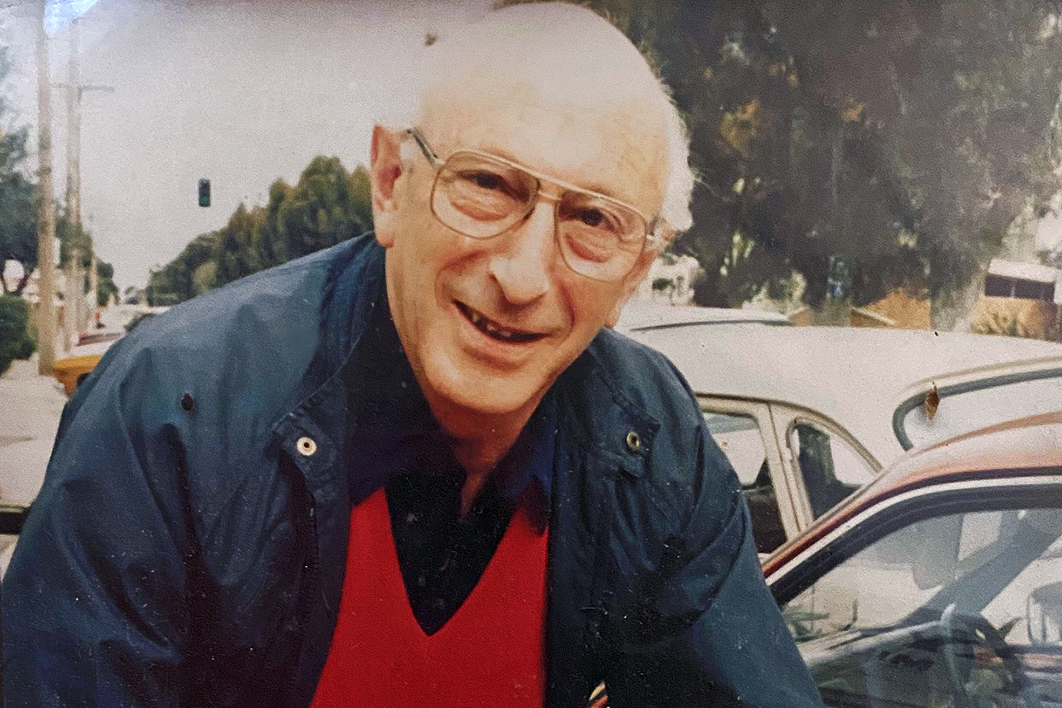In the new Canberra suburb of Denman Prospect there’s a Goldbloom Street, named for Samuel Mark Goldbloom. Denman Prospect itself is named after Lady Denman, the governor-general’s wife who in 1913 announced that the capital would be called Canberra, and the people who have given their names to its streets were activists of various political shades. All of them are dead; some of them I knew, or knew of — but Goldbloom Street? That would have had me stumped.
Who Sam Goldbloom was and why he came to be honoured thus is the focus of Sandra Goldbloom Zurbo’s My Father’s Shadow. While most of Goldbloom Zurbo’s published work has been fiction — stories in literary journals, the acclaimed novel The Book of Rachel — this new book is a work of remembrance, a memoir.
As most of us who have ever tried this form know, writing a memoir is far harder than it seems. What to put in, what to leave out — that’s the perennial question, and at bottom is the problem of memory itself, when so much of what’s remembered can’t be corroborated and our recollections, by their very nature, are riddled with fiction.
In a forthright introduction, Goldbloom Zurbo confronts the difficulties head-on. You learn (if, like me, you didn’t know already) that Sam Goldbloom was a prominent activist in the international anti-nuclear peace movement. A founder of at least two of its key Australian branches and secretary of the Vietnam Moratorium Campaign, he also belonged to the Labor Party.
Through thick and thin, though, he was a loyal supporter of the Soviet Union, his Communist Party membership largely a secret except within ASIO and Victoria’s Special Branch, the secretive intelligence-gathering section of the police. Handsome, tall and charismatic, reputedly an electrifying public speaker, he was a hero to Sandra, the eldest of his three daughters. Yet he was also her “nemesis all the days of his life.”
The story she tells of this filial relationship will resonate with many readers. Our parents are magically powerful beings, exerting a hold both positive and negative until with maturity we see them for what they were: flawed human beings who did their best at parenting according to their circumstances and the precepts of their day.
But Goldbloom Zurbo portrays a family drama unusually Shakespearean, not to say Freudian, in its intensity. Hers was a rebellious adolescence, which for all her father’s left sympathies puzzled and dismayed him. For minor misdemeanours and well into her teens, he administered humiliating physical punishments. Today we would look askance, if not in horror, at a father spanking his teenage daughter on the buttocks or the backs of her thighs, acts in our reckoning disturbingly sexual as well as psychologically charged.
Nor did the stories Goldbloom routinely told about himself hold up to his daughter’s scrutiny. As in Germaine Greer’s Daddy, We Hardly Knew You, though not to the same degree, Sam Goldbloom’s past proved a fertile ground for myth-making:
Mystery surrounds many of the stories he told about his life. True, he was a flight mechanic in the airforce during the war. But was he in New Guinea? Did he really learn Japanese to act for the Australian armed forces as an interpreter of Japanese prisoners of war — he who could speak very little Yiddish and barely a word of any other non-English language? What about the story he told of his father pretending to beat him at the behest of his cruel mother? Was that true — or did his father really beat him?
On the positive side, her father’s political involvements widened her horizons. His daughters came to know a dazzling cavalcade of guests — people like Jessie Street, Doc Evatt, Paul Robeson, Benjamin Spock and Danny Kaye. Accompanying him to Indonesia, sixteen-year-old Sandra was enchanted by the sights and smells of a wildly different culture and danced with President Sukarno not long before he was toppled by Suharto. In Moscow she met Wilfred Burchett, the exiled Australian communist known as the first Western journalist to write of the horrific civilian casualties at Hiroshima and Nagasaki.
At home it was obvious the family was under surveillance — the van parked outside the house, the telltale clicks during telephone calls — a circumstance they handled as other left-wing families did with nonchalance and humour, yet taking certain precautions. When Sandra was old enough she too joined the Communist Party, but her membership didn’t last long.
The quashed Hungarian uprising, Khrushchev’s speech to the twentieth Party Congress, the Soviet tanks rolling through Prague — each of these prompted people to abandon the party. But Sam Goldbloom held his ground. The New Left, civil rights and women’s liberation all marched past, sweeping along his daughters, but Soviet Russia remained for him the vanguard of world peace. Sandra argued with him at the same time as she worshipped him and dreaded his disapproval.
Before going further I have a couple of admissions to make. Readers should know that Goldbloom Zurbo and I met in the 1970s at a women’s liberation conference and she’s been a friend of mine since. I’ve also admired her writing, but all that she’s written in this book has been news to me. And as one who’s had a go at memoir-writing myself and so far failed with it, I’ve developed an interest in what makes memoirs work, and why the best of them are so absorbing.
It seems to me now that good memoirs have a focus, are organised around a theme, instead of strictly following chronology. They don’t seem to work so well as straightforward, linear narratives — indeed, it seems to be the writer’s task to play havoc with chronology.
A successful memoir, then, isn’t an exposition steadily plodding from one phase in life to the next. In any case, as the French philosopher Henri-Louis Bergson showed us, that isn’t the way we live our lives, or experience them. The past is the mulch of our present as well as a powerful determinant of our future. Still, Goldbloom Zurbo has structured a courageous, compelling narrative that in its way moves forward in time, much of which is concerned with the long, fraught, painful trajectory of Sam Goldbloom’s dying.
Throughout the looping accretion of memories we gradually learn more about him: that, British-born and Jewish, he migrated to Australia as a youngster with his parents and and his brother; that though he wasn’t observant, his Jewishness was important to him; that, uxorious, he was nonetheless a serial philanderer. We see him young, all six-foot-three of him, with large ears, freckles and reddish-brown hair; we see him ageing. We learn that he had beautiful hands, with long fingers that Sandra admired so much she couldn’t begin to contemplate pairing up with a stubby-handed man.
And still there’s a lot that’s missing. We glean in passing that Goldbloom Zurbo was married to a man named Jack, but what happened after that, and when and how, is unsaid. She’s the oldest of three sisters, but we know them only as Sister Two and Sister Three, as she is Number 1, as their father was given to call her. She is a mother, now a grandmother, but such momentous experiences in a woman’s life get little more than a glance.
On the other hand, Rosa, or Rosy, her mother and Sam’s wife, and two other women with whom he had affairs are vividly depicted. But although Rosa and Sam ran a wholesale business from the garage of one of their houses, we learn little about how he, or they, made a living.
That the narrative succeeds when so much is left out — or possibly because it is left out — is intriguing. I point to these lacunae not to criticise but to emphasise the skill with which the author tells her tale and how she deploys the emotional freight it carries in the strikingly visceral tenderness of her prose. Here she is, massaging her dying father’s feet.
“I take his foot and cradle it between my warm hands. ‘Cold,’ I remark, discomfited by the prickliness, repulsed by the thick, chilly flesh.” To this he replies, “They are always cold. No circulation, they tell me. Ever since the surgery.” Then, from her: “I do not enquire which surgery; it is unlikely we will agree. We would grow irritated with each other. Eventually, we would bicker.”
What is a man, his life? What remains of him in the hearts of those who were closest to him? Whatever we make of it turns out to be a great deal more than a street in a new Canberra suburb. Memoir, fiction, non-fiction… perhaps these categories are meaningless; marketing tools, little more.
The real truth is that My Father’s Shadow is a powerful, unputdownable book. •
My Father’s Shadow: A Memoir
By Sandra Goldbloom Zurbo | Monash University Publishing | $32.99 | 288 pages




